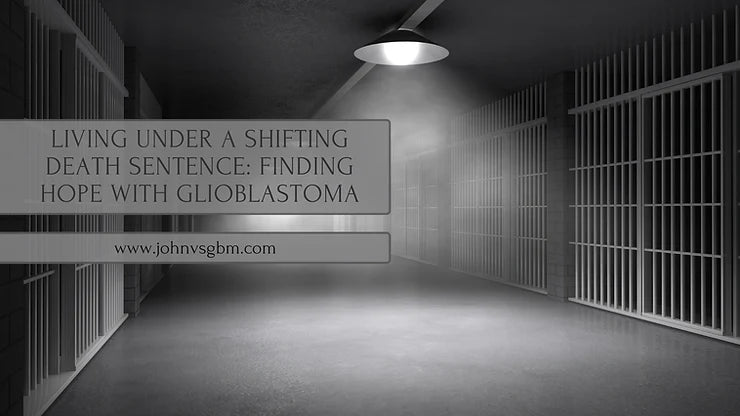Living Under a Shifting Death Sentence: Finding Hope with Glioblastoma

Living Under a Shifting Death Sentence: Finding Hope with Glioblastoma
Living Under a Shifting Death Sentence: Finding Hope with Glioblastoma
I have been reflecting a lot lately on the importance of empathy versus sympathy, and the need to truly put ourselves in others' shoes before passing judgment. This has taken on a profound new meaning for me since my Glioblastoma diagnosis. One of the most challenging aspects of living with Glioblastoma is the uncertainty. Unlike some treatable cancers with clear survival rates, Glioblastoma leaves us grappling with the unknown.
The Shifting Sentence
Living with Glioblastoma often feels like being a prisoner under a death sentence, with the judge continuously changing the execution date. This analogy, shared by someone on a support page I follow, resonates deeply with me. The stress of trying to plan my remaining time—whether it is one year or eight—is overwhelming. One day, I feel hopeful after a clear scan. The next, I am spiraling with fear after reading about someone who declined rapidly. The mental whiplash is exhausting.
People often advise taking it one day at a time, but that is easier said than done. When your brain is constantly calculating how much time you may or may not have left, it is hard to stay grounded. Although I am grateful for every moment, the ambiguity of the future weighs on me heavily. There are nights I lie awake wondering if this headache is just dehydration or something worse. There are days when I feel strong, only to crash with anxiety hours later.
It is like playing a game without rules, where the only consistent thing is inconsistency. I have learned that even good news from a doctor does not always bring relief—it often triggers survivor’s guilt. Why am I doing okay when others are not? What if this is just a calm before the storm? These thoughts consume my mental space, making it hard to focus on work, relationships, or even basic routines.
Redefining Life’s Priorities
In response to this uncertainty, my husband and I are learning to live differently. We are trying not to take life too seriously. We have scaled back our schedules, prioritized time together, and learned to say no to anything that feels draining. Spirituality plays a big role, even if that just means sitting in silence and breathing through the tough moments. We have stopped waiting for "someday" and started creating our own meaning in the present.
We celebrate small victories like making it to dinner without fatigue or simply spending the afternoon on the porch without intrusive thoughts. These seemingly ordinary experiences become extraordinary when you are living with a terminal illness. The gravity of Glioblastoma forces you to slow down, appreciate the details, and live honestly—even when it is hard.
We've also been embracing simplicity in our day-to-day life. That means eliminating clutter—physical, emotional, and digital. We donate what we do not use. We reduce commitments that feel like obligations instead of joys. We try to make time for people who lift us up, and slowly move away from those who drain us, even if unintentionally. Life is too short and precious to be anything but deliberate with our energy.
Letting Go of Control
One of the most brutal lessons I have had to learn is the art of letting go. Letting go of control, of expectations, of the illusion that life is linear. Planning a year out feels almost laughable now. So instead, we plan for today. We look at weather apps and decide if it is a good day for a drive or a hike. We gauge my energy levels hour by hour. We say "yes" to joy and "no" to guilt.
When the world feels uncertain, rituals help. My morning coffee, writing in this blog, chatting with friends online—these become anchors. They remind me I am still here, still living. It might not be the life I imagined, but it is still mine. And I am learning to make peace with that. Some days, I just sit by the window and listen to the wind move the trees, because even that small act feels grounding and sacred.
What I Want Others to Know About Glioblastoma
People often ask, "What can I do for someone with Glioblastoma?" My answer is simple: be present. Do not try to fix us. Do not bombard us with miracle cures. Just show up. Listen. Let us talk if we want to. Sit quietly if we do not. Share a laugh. Let us cry. Let us be scared. Let us be human.
It is not about having the right words—it is about showing up. When people avoid me because they do not know what to say, that silence hurts more than any awkward moment. Just being there—even if you do not have answers—is enough. Ask how I am. And mean it. Ask what I need. Be patient when I do not know.
Hope Is Not Naïve
Hope looks different now. It is no longer about beating the odds with a cure. Hope is waking up and feeling like myself for a few hours. It is laughing with my husband over something silly. It is writing this post. It is sharing my truth and knowing someone out there might feel less alone because of it.
Hope is not always loud or bold. Sometimes it is quiet, stubborn, and private. But it is there. And when I feel it, I let it in. Because Glioblastoma may threaten my body, but it will not take my soul. Not today. Not while I still have something to say.
Hope is also looking forward to small things. A good meal. A warm bed. A text from a friend. It’s embracing imperfections in the day. Hope can be found in music, in prayer, in journaling, or just breathing. I try not to put pressure on myself to always feel hopeful. I just leave the door open for it to visit.
Finding Resilience in the Present
Moving forward, I encourage anyone facing similar challenges to embrace this mindset. Focus on what you can control, cherish the moments you have, and find strength in the present. We may not know what tomorrow holds, but we can choose to make today meaningful. This is much easier said than done—and some days you will fail. But keep trying. Keep living. Keep finding your own path to peace.
Living with Glioblastoma is terrifying and unpredictable, but it also brings clarity. It brings into focus what truly matters—connection, compassion, and authenticity. It has stripped away the noise and shown me what I hold dearest. In that sense, it has given me more than it has taken.
I want others to understand that when we talk about living with Glioblastoma, we are not just talking about surviving—we are talking about redefining what living really means. We are rewriting what hope, joy, and love look like in the face of an uncertain future. And in doing so, we are creating something uniquely beautiful, even in the midst of pain.
Helpful Resources
- American Brain Tumor Association (ABTA)
- Cancer.net – Glioblastoma Overview
- More Reflections from JohnVsGBM
Tags: Glioblastoma, Brain Cancer, Living with Uncertainty, Finding Hope, Terminal Illness Journey, Brain Tumor Support, Mindset Shift, JohnVsGBM
Disclaimer: This blog shares personal experiences living with Glioblastoma. It is not medical advice. Always consult your care team before making decisions about your health or treatment plan. For emotional support, call or text 988.


 NEW ARRIVALS
NEW ARRIVALS APPAREL
APPAREL GIFT AND HOME
GIFT AND HOME COLLECTION'S
COLLECTION'S HOPE HUB
HOPE HUB BLOG
BLOG



